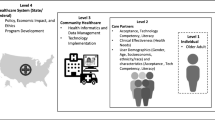Abstract
Healthcare robots are being developed to help older people maintain independence. This randomised cross-over trial aimed to investigate whether healthcare robots were acceptable and feasible and whether the robots could impact quality of life, depression and medication adherence. 29 older adults living in independent units within a retirement village were given robots in their homes for 6 weeks and had a non-robot 6-week control period, in a randomised order. The robots reminded people to take medication, provided memory games, entertainment, skype calls, and blood pressure measurement. The robots were found to be acceptable and feasible, and many participants described them as useful and as friends although not all comments were positive. There were relatively few problems with robot functions. The participants’ perceptions of the robots’ agency reduced over time. The robots had no significant impact on adherence, depression or quality of life. While the robots were feasible and acceptable, improvements in their reliability and functionality may increase their efficacy.
Access this chapter
Tax calculation will be finalised at checkout
Purchases are for personal use only
Preview
Unable to display preview. Download preview PDF.
Similar content being viewed by others

References
Bemelmans, R., Gelderblom, G.J., Jonker, P., de Witte, L.: Socially assistive robots in elderly care: A systematic review into effects and effectiveness. J. Am. Med. Dir. Assoc. 13, 114–120 (2012)
Broekens, J., Heerink, M., Rosendal, H.: Assistive social robots in elderly care: A review. Gerontechnology 8, 94–103 (2009)
Broadbent, E., Stafford, R., MacDonald, B.: Acceptance of healthcare robots for the older population: Review and future directions. Int. J. Soc. Robot. 1, 319–330 (2009)
Wada, K., Shibata, T., Saito, T., Tanie, K.: Effects of robot-assisted activity for elderly people and nurses at a day service center. Proc. IEEE 92, 1780–1788 (2004)
Dario, P., Guglielmelli, E., Laschi, C., Teti, G.: MOVAID: a personal robot in everyday life of disabled and elderly people. Technology and Disability 10, 77–93 (1999)
Noury, N.: AILISA: experimental platforms to evaluate remote care and assistive technologies in gerontology. In: Proc. of 7th International Workshop on Enterprise networking and Computing in Healthcare Industry, HEALTHCOM 2005, pp. 67–72 (2005)
Fasola, J., Mataric, M.A.: Socially assistive robot exercise coach for the elderly. Journal of Human-Robot Interaction 2, 3–32 (2013)
Mehrholz, J., Hadrich, A., Platz, T., Kugler, J., Pohl, M.: Electromechanical and robot-assisted arm training for improving generic activities of daily living, arm function, and arm muscle strength after stroke. Cochrane Database of Systematic Reviews 6, CD006876 (2012)
Robinson, H., MacDonald, B.A., Kerse, N., Broadbent, E.: The psychosocial effects of a companion robot: A randomized controlled trial. Journal of the American Medical Directors Association 14, 661–667 (2013)
Banks, M.R., Willoughby, L.M., Banks, W.A.: Animal-assisted therapy and loneliness in nursing homes: use of robotic versus living dogs. J. Am. Med. Dir. Assoc. 9, 173–177 (2008)
Broadbent, E., Tamagawa, R., Patience, A., Knock, B., Kerse, N., Day, K., MacDonald, B.A.: Attitudes towards health care robots in a retirement village. Australasian Journal on Ageing 31, 115–120 (2012)
Stafford, R.Q., Broadbent, E., Jayawardena, C., Unger, U., Kuo, I.H., Igic, A., Wong, R., Kerse, N., Watson, C., MacDonald, B.A.: Improved robot attitudes and emotions at a retirement home after meeting a robot. In: IEEE International Symposium on Robot and Human Interactive Communication, pp. 82–87 (2010)
Stafford, R.Q., MacDonald, B.A., Jayawardena, C., Wegner, D.M., Broadbent, E.: Does the Robot Have a Mind? Mind Perception and Attitudes Towards Robots Predict Use of an Eldercare Robot. International Journal of Social Robotics 6, 17–32 (2014)
Datta, C., Tiwari, P., Yang, H.Y., Kuo, I., Broadbent, E., MacDonald, B.: An interactive robot for reminding medication to older people. In: Proceedings of the 9th International Conference on Ubiquitous Robots and Ambient Intelligence (URAI 2012), Deajeon, Republic of Korea (2012)
Datta, C., Tiwari, P., Hong Yul, Y., Broadbent, E., MacDonald, B.A.: Utilizing a closed loop medication management workflow through an engaging interactive robot for older people. In: IEEE 14th International Conference on Paper Presented at: e-Health Networking, Applications and Services, Healthcom (2012)
Jayawardena, C., Kuo, I., Datta, C., Stafford, R.Q., Broadbent, E., MacDonald, B.A.: Design, implementation and field tests of a socially assistive robot for the elderly: HealthBot Version 2. In: RAS/EMBS International Conference on Biomedical Robotics and Biomechatronics, pp. 1837–1842 (2012)
Hodkinson, H.M.: Evaluation of a Mental Test Score for Assessment of Mental Impairment in the Elderly. Age Ageing 1, 233–238 (1972)
Ware, J.E., Kosinski, M., Keller, S.D.: A 12-item short-form health survey: Construction of scales and preliminary tests of reliability and validity. Med. Care 34, 220–233 (1996)
Yesavage, J.A., Brink, T.L., Rose, T.L., Lum, O., Huang, V., Adey, M., Leirer, V.O.: Development and validation of a geriatric depression screening scale: A preliminary report. J. Psychiatr. Res. 17, 37–49 (1983)
Horne, R., Weinman, J.: Patients’ beliefs about prescribed medicines and their role in adherence to treatment in chronic physical illness. J. Psychosom. Res. 47, 555–567 (1999)
Gray, H.M., Gray, K., Wegner, D.M.: Dimensions of mind perception. Science 315, 619 (2007)
Author information
Authors and Affiliations
Editor information
Editors and Affiliations
Rights and permissions
Copyright information
© 2014 Springer International Publishing Switzerland
About this paper
Cite this paper
Broadbent, E. et al. (2014). Robots in Older People’s Homes to Improve Medication Adherence and Quality of Life: A Randomised Cross-Over Trial. In: Beetz, M., Johnston, B., Williams, MA. (eds) Social Robotics. ICSR 2014. Lecture Notes in Computer Science(), vol 8755. Springer, Cham. https://doi.org/10.1007/978-3-319-11973-1_7
Download citation
DOI: https://doi.org/10.1007/978-3-319-11973-1_7
Publisher Name: Springer, Cham
Print ISBN: 978-3-319-11972-4
Online ISBN: 978-3-319-11973-1
eBook Packages: Computer ScienceComputer Science (R0)



